#World building?
Explore tagged Tumblr posts
Text
Have a small wip of Down in the Deep Au
(No Sebastian in this, but hey anonymous asker I might've lost your ask about if Danny dimension travelled or was the only one from DP, and the answer is yeah. At least currently)
------------------------------------------------------------------------------
Now, it wasn’t the best idea, but it was near instinctive in his exhaustion and panic, to open his mouth and wail.
And wail he did, the sound shrieking forward and tearing through the metal and charging ghost. Not that he saw, eyes clenched closed as he was launched back into the swirling greens of the zone.
If he’d kept his eyes open a moment more he’d have seen how unstable the area around him had grown, would have seen the portal sputtering around him. Natural portals were more rare than one would think, a relief to ghosts as the chance of one opening on one of them would be deadly.
In fact, for any other ghost, it would have killed them permanently. It would rip apart their very essence and leave the ghost nothing but a shade- they were referred to as unstable for a reason after all.
But Danny wasn’t just any ghost, he was one created by the opening of a portal, the blood sacrifice, accidental or not, that fueled that initial tear. No, this gnashing, wild thing would not rip him apart like it would anything else, not when he was made from the same tearing, fracturing force.
#my writing#down in the deep au#danny phantom crossover#pressure crossover#danny fenton#danny phantom#roblox pressure#I am so sorry anon idk where your ask went😭😭#I think I could have deleted it accidentally (I had to delete so much spam bot stuff)#Anyway have Danny about to crash into a hall in the Hadal Blacksite#world building?#world building#writing wip
68 notes
·
View notes
Note
Do you think the triple d would like the paw patrol?
Depends on what you mean.
Is the Paw Patrol an animated cartoon in this world, or are they fellow actors?
For the first one, I'd say Triple D pretends to not like the show, cause its for little kids, how cringe! However they all actually love the show and will watch it on their tablet in their trailer. No one can know!
As for the second, well I have no idea what the paw patrol character's would be like off or on the show. Never seen much of it. (Marshal's really insecure right?) I'd imagine they wouldn't be quiet as cheery and upbeat all the time like on the show, but they'd have similar personalities to their show ones. If Marshal is as insecure as I remember, then it be funny if he had a cute kid crush on one of Triple D but would be too anxious to tell them. Triple D might be friends with Sky, then Sky can roll her eyes whenever Marshal stares longingly from afar at the studio. (On that note, in this context, the Paw Patrol pups are between 11 and 7 years of age, since I head cannon Triple D at 7 in the show myself.) OF COURSE this all hinges on Paw Patrol somehow being filmed in Britain, but that's not impossible. Paw Patrol is owned by a Canadian company. Canada and Britain have worked very closely when making animated shows for years, like my childhood favourite 'Watership Down' from 1999. So yeah, its possible!
I don't know a lot about Paw Patrol. I got out of babysitting by the time it was big. You guys have any ideas fro what the Paw Patrol's personalities would be like off set?

7 notes
·
View notes
Text
Random thoughts for a project inspired by Diane Duane's Omnitopia
Book one has sat around in my head for forever, and book two doesn't seem to be coming out ever y.y
Maybe this'll be fanfiction, maybe not, idk.
The most basic premise of omnitopia is that there is a technology that allows people to jack in to a virtual world, and explore it as if they were in their own body. There is also a software run by a Totally Normal Video Game Company that definitely takes some hints from Blizzard / Bethesda pre-enshittification where mods and custom maps were easy and encouraged to to be made, and there was some level of developer involvement in a positive sense; in universe, this was a set of tools that allowed people to make their own worlds, their own games, their own everything using their engine / software. People could log into what had been a bog standard MMO, and then travel through portals to other universes.
Mostly, I've been disenfranchised with a lot of that, but at the time of the books release, the future was pretty bright, the big video game companies weren't as obviously evil (looking back, knowing what I know now.... look, I was in high school, leave me alone, I wasn't even a leftist then), and the idea of an MMO that allowed infinite variance and infinite future stories put in the hands of the common person was really cool.
Regardless, a lot of it has rattled around in my head over the years, and I keep coming back to a core concept that took root; the idea of a technology that allows people to jack into a virtual world and explore it as if they were in their own body, for the explicit purpose of MMORPG's, BUT instead of playing it in real time, they instead upload their personality and memories, and upload it into the game. There is no logging out, because the idea is that your body (the original you) unplugs, and goes about their day. They go to work. They go and do things. You essentially clone yourself to go and have activity. At a later point, you then download the experiences of the avatar, and enjoy the in-detail memories.
I've played around with it in a few ways in my head; time dilation was one I kept coming back to, but ultimately decided was a bad idea; you leave your avatar in there for 1 minute, you get 60 minutes of gameplay back. One day, 60 days. One month, five years. How long does it take before the memories of the person you put in no longer feel like you? Those memories aren't contextless; your avatar is living them, your avatar has thoughts about them, maybe even the Avatar isn't having a good time about it. How many of us have tried a game out, only to go "wow I hate this actually", only now you can't back out? It's great for a philosophical "Don't create the torment nexus", but I'm not really interested in writing that kind of book.
Another one I kept coming back to was the idea of a team of developers, and A.I., who are in charge of story telling within the game. They're constantly watching for errors and odd things. Mostly, I just felt that they were interesting but purposeless within a narrative sense, except to explain certain sudden changes, or bug fixes.... but why tell that at all? If I'm writing a story, I want it to be about the characters living it, not the gods above trying to figure out ways to "fix" things.
I've also messed around with the idea of how this ultimately allows a company to have free access to your mind and soul. The freemium MMO's of today, and what they would do with your mind if they could; intellectual slavery (Just cordon off a copy in a datafarm, have them work on bullshit, who would ever know?), advertisement via direct implantation (you're downloading memories already. It's not that difficult to imagine the nauseating level of "Your avatar ate LOTS of MCDONALDS and ENJOYS IT, here are 6 months of ENJOYMENT from BURGER".), but this, too, ultimately is just more of philosophical "Don't Create the Torment Nexus" stuff that isn't really interesting to me. Someone else can write that. Enjoy. I'm sure cyberpunk will love being rehashed again.
So, what exactly does interest me in this? I think I like the idea of characters who are Functionally Modern, who are playing a game, and getting enjoyment out of it. The game itself is an MMO with a hyper-realistic setting; mechanics of the game don't really "exist", so much as there are physics. The game itself isn't complex, just "What if World War 1, but there's magic?" "What if you were part of a community of farmers?" "What if it's a complex world that you are encouraged to explore, but there aren't any NPCs, so everything has to be done by players, so make sure to encourage players who are different from you and enjoy the game differently than you do, so you can still access the kind of things they do like crafting!" "What if Mega-dungeon Dungeon Meshi MMO?"
I like the community aspect. I like the idea of people interacting with and exploring the world, and the idea of exploring the systems within them. I like the idea of it being exceptionally violent and terrifying and gory, but it's okay because none of it is permanent, you can opt out, there are limits and lines.
I think my favorite is probably still the WW1 version. A slow burn of a war, filled to the brim with magic that only makes it worse. I'm pretty sure the game itself would be called "The Forever War" or something similar. The main character creates their character, deciding at the start to go against the meta, not because they think it's actually good but, because they just wanted to RP as that character. The war is already entrenched. They arrive by train to the battlefield, and they already have to deal with trench foot. They spend a lot of the book just chatting with other players, caring for the equipment, doing minor enchantment work, recovering fallen player's so they can be revived, and eventually dying before they even shoot their gun for the first time because they stuck their head out and got sniped. There isn't even a waiting period, they just wake up later, revived and go "Woops haha".
I think the main character would be a silly clumsy failgirl transgirl, both because that's the way she is, and also because that's the way she's RPing. She's a dummy who enjoys the tedium of this war, the bursts of combat and adrenaline, and the feeling of camaraderie that she doesn't get in real life. She enjoys hanging out with all these folk, who are also all going to be just as queer as she is, she enjoys how terrible it is, she enjoys exploring the way the system and mechanics can be broken in subtle ways. I think she'd be autistic. She knows too much about this game, but she's never played it. She's read all the wiki's and guides, and doesn't know that last week a player discovered how to teleport using a glitch, and now hypermobility is out in the meta because it can be replicated with heavier builds using the glitch. She knows about how players value a quality of life enchantment more than a damage spell, but she doesn't know that the average player is more than happy to cuddle at the end of the shift in the trench because they're just as touch starved as she is.
I think the game has set it up so that every country is in fleeting alliances with one another, constantly shifting in diplomacy and technology, and they fight over resources between each other, each one trying to get just enough of an advantage to push on another one, to hold just long enough to build one more tank. Pockets of resistance, holding out against hope, and completely cut off, hoping that an armored car might come to get them and the resources they were protecting and make it worth it. The country the main character is in is a minor one; they have one or two resources left, and they're making pushes out, but it's probably doomed. Half the players are already talking about which country they'll join after, the other half about waiting for the global reset. There's a feeling of gallows humor, but also stubborn joy; they chose this.
anyways, that was a lot of thoughts, and maybe I'll do something with this later. But probably not <3
2 notes
·
View notes
Text
If tfs have fraying wires could they have like tummy hair
3 notes
·
View notes
Text
a list of 100+ buildings to put in your fantasy town
academy
adventurer's guild
alchemist
apiary
apothecary
aquarium
armory
art gallery
bakery
bank
barber
barracks
bathhouse
blacksmith
boathouse
book store
bookbinder
botanical garden
brothel
butcher
carpenter
cartographer
casino
castle
cobbler
coffee shop
council chamber
court house
crypt for the noble family
dentist
distillery
docks
dovecot
dyer
embassy
farmer's market
fighting pit
fishmonger
fortune teller
gallows
gatehouse
general store
graveyard
greenhouses
guard post
guildhall
gymnasium
haberdashery
haunted house
hedge maze
herbalist
hospice
hospital
house for sale
inn
jail
jeweller
kindergarten
leatherworker
library
locksmith
mail courier
manor house
market
mayor's house
monastery
morgue
museum
music shop
observatory
orchard
orphanage
outhouse
paper maker
pawnshop
pet shop
potion shop
potter
printmaker
quest board
residence
restricted zone
sawmill
school
scribe
sewer entrance
sheriff's office
shrine
silversmith
spa
speakeasy
spice merchant
sports stadium
stables
street market
tailor
tannery
tavern
tax collector
tea house
temple
textile shop
theatre
thieves guild
thrift store
tinker's workshop
town crier post
town square
townhall
toy store
trinket shop
warehouse
watchtower
water mill
weaver
well
windmill
wishing well
wizard tower
#worldbuilding#setting prompts#writer resources#writing inspiration#writing prompts#scene settings#writing reference#writing ideas#prompt list#creative writing#writing community#writer prompts#writing tips#world#fantasy world#fantasy worldbuilding#high fantasy#world building#epic fantasy#writing fantasy
102K notes
·
View notes
Text
IVE FOUND A SOLUTION. In my greyscaled world, the void (I'm coming up with a new name for it) is shrouded in darkness. But the problem is I haven't found a reason for this until now. What I could do is make these giant, California redwood tree type trees. They would be like in the rainforest, thick leaves and lots of branches and leaves. This would leave everything completely dark. This would also give a tall place for the spider to pounce down on its prey. It would also have tall grass and areas like bogs and swamps. I have an idea for maybe a false tree that I could work on.
0 notes
Text




How equal can a society be if some fundamentals are unusable by a third of the population? You can learn a lot about a world by looking at the little details, especially in furry settings!
#furgonomics#ttrpg worldbuilding#worldbuilding#furryart#sfw furry#furry art#fantasy world#firnus#saints of firnus#saintsoffirnus#dnd#world building#low fantasy#furry#anthro#fantasy#furries#pls excuse any spelling errors it's not my strong point haha 😬
5K notes
·
View notes
Text
I personally think it would be extremely funny if The Hunger Games and Mad Max took place in the same universe and America and Australia just dealt with this apocalypse very differently.
#the real answer to 'well what is the rest of the world like?'#this is probably not doable for both universes' world-building but it would be EXTREMELY funny#bedlam watches movies#10k#15k#20k
26K notes
·
View notes
Text

So fun question for @asexxxualerotica and @freeusemuses something that's rattling in my brain currently is what the initial thoughts and impressions the rest of the zirconia clan has of Rosemary when she first appeared to them. So what would the rest of her half siblings think of her when they first meet her vs what they might have now?
0 notes
Text
if we look at the original timeline (aka annabeth and percy being born in 1993) then 2009 was a big year for annabeth bcus not only did the battle of manhattan take place and she finally started dating percy, but also minecraft came out and i think that would be a big deal to her
#i think specifically the pc version cane out in 2009 and i can imagine her using her daedalus laptop to create the most glorious builds ever#sometimes she lets percy play as well but he has to have a separate world#pjo#annabeth chase#percy jackson#percabeth#percy jackson and the olympians#minecraft#1k+#cntp
21K notes
·
View notes
Text
One detail I've always really liked in dunmeshi's worldbuilding is the difference in life expectancies among races. I don't mean the different rates at which they age but specifically how long they live from the point of view of their own group. For example, dwarfs are directly stated to age 2.5x slower than a tall-man, but where tall-men's life expectancy is only about 60, for a dwarf it would be about 200 (equivalent to 80).
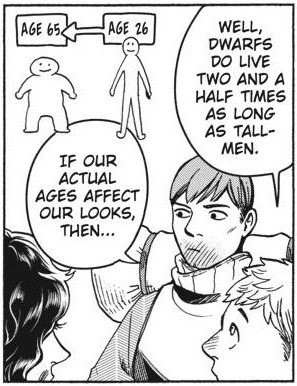
At first this stood out as odd to me but it makes sense when you look up the average lifespan for every race. In general, the short-lived races all have a smaller age of maturity to life expectancy ratio than all the long-lived ones.
I really love this discrepancy because the implication here is that long-lived races not only have longer lifespans due to aging slower, but they also just live longer generally due to a better quality of life, as they have taken the most fertile and livable lands to themselves, resulting in less conflicts over resources and faster technological developments.
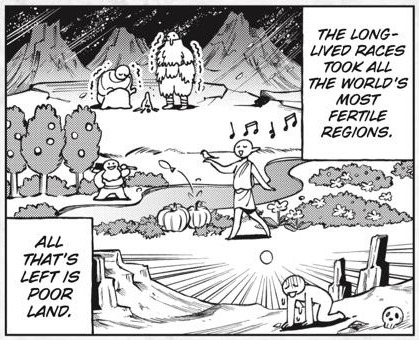
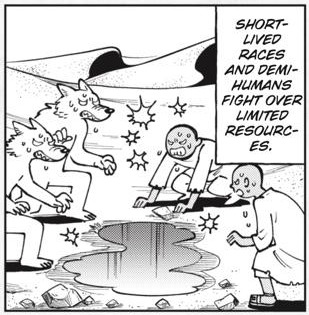
Ultimately how long you live isn't just a fantastical element of the setting, but a political one as well.
9K notes
·
View notes
Text
Principles and Laws of Magic for Fantasy Writers
Fundamental Laws
1. Law of Conservation of Magic- Magic cannot be created or destroyed, only transformed.
3. Law of Equivalent Exchange- To gain something, an equal value must be given.
5. Law of Magical Exhaustion- Using magic drains the user’s energy or life force.
Interaction and Interference
4. Law of Magical Interference- Magic can interfere with other magical effects.
6. Law of Magical Contamination- Magic can have unintended side effects.
8. Law of Magical Inertia- Magical effects continue until stopped by an equal or greater force.
Resonance and Conditions
7. Law of Magical Resonance- Magic resonates with certain materials, places, or times.
9. Law of Magical Secrecy- Magic must be kept secret from the non-magical world.
11. Law of Magical Hierarchy- Different types of magic have different levels of power and difficulty.
Balance and Consequences
10. Law of Magical Balance- Every positive magical effect has a negative consequence.
12. Law of Magical Limitation- Magic has limits and cannot solve every problem.
14. Law of Magical Rebound- Misused magic can backfire on the user.
Special Conditions
13. Law of Magical Conduits- Certain objects or beings can channel magic more effectively.
15. Law of Magical Cycles- Magic may be stronger or weaker depending on cycles (e.g., lunar phases).
17. Law of Magical Awareness- Some beings are more attuned to magic and can sense its presence.
Ethical and Moral Laws
16. Law of Magical Ethics- Magic should be used responsibly and ethically.
18. Law of Magical Consent- Magic should not be used on others without their consent.
20. Law of Magical Oaths- Magical promises or oaths are binding and have severe consequences if broken.
Advanced and Rare Laws
19. Law of Magical Evolution- Magic can evolve and change over time.
20. Law of Magical Singularities- Unique, one-of-a-kind magical phenomena exist and are unpredictable.
Unique and Imaginative Magical Laws
- Law of Temporal Magic- Magic can manipulate time, but with severe consequences. Altering the past can create paradoxes, and using time magic ages the caster rapidly.
- Law of Emotional Resonance- Magic is amplified or diminished by the caster’s emotions. Strong emotions like love or anger can make spells more powerful but harder to control.
- Law of Elemental Harmony- Magic is tied to natural elements (fire, water, earth, air). Using one element excessively can disrupt the balance and cause natural disasters.
- Law of Dream Magic- Magic can be accessed through dreams. Dreamwalkers can enter others’ dreams, but they risk getting trapped in the dream world.
- Law of Ancestral Magic- Magic is inherited through bloodlines. The strength and type of magic depend on the caster’s ancestry, and ancient family feuds can influence magical abilities.
- Law of Symbiotic Magic- Magic requires a symbiotic relationship with magical creatures. The caster and creature share power, but harming one affects the other.
- Law of Forgotten Magic- Ancient spells and rituals are lost to time. Discovering and using forgotten magic can yield great power but also unknown dangers.
- Law of Magical Echoes- Spells leave behind echoes that can be sensed or traced. Powerful spells create stronger echoes that linger longer.
- Law of Arcane Geometry- Magic follows geometric patterns. Spells must be cast within specific shapes or alignments to work correctly.
- Law of Celestial Magic- Magic is influenced by celestial bodies. Spells are stronger during certain astronomical events like eclipses or planetary alignments.
- Law of Sentient Magic- Magic has a will of its own. It can choose to aid or hinder the caster based on its own mysterious motives.
- Law of Shadow Magic- Magic can manipulate shadows and darkness. Shadowcasters can travel through shadows but are vulnerable to light.
- Law of Sympathetic Magic- Magic works through connections. A spell cast on a representation of a person (like a doll or portrait) affects the actual person.
- Law of Magical Artifacts- Certain objects hold immense magical power. These artifacts can only be used by those deemed worthy or who possess specific traits.
- Law of Arcane Paradoxes- Some spells create paradoxes that defy logic. These paradoxes can have unpredictable and often dangerous outcomes.
- Law of Elemental Fusion- Combining different elemental magics creates new, hybrid spells with unique properties and effects.
- Law of Ethereal Magic- Magic can interact with the spirit world. Ethereal mages can communicate with spirits, but prolonged contact can blur the line between life and death.
- Law of Arcane Symbiosis- Magic can bond with technology, creating magical machines or enchanted devices with extraordinary capabilities.
- Law of Dimensional Magic- Magic can open portals to other dimensions. Dimensional travelers can explore alternate realities but risk getting lost or encountering hostile beings.
- Law of Arcane Sacrifice- Powerful spells require a sacrifice, such as a cherished memory, a personal item, or even a part of the caster’s soul.
#writer#writing#writer things#writerblr#writerscorner#writing inspiration#writing tips#author#writers and poets#ao3 writer#writeblr#fantasy writer#sci fi and fantasy#writing inspo#writing resources#dnd campaign#dnd character#character development#original character#amwriting#writers community#writer stuff#writing blog#writers block#writerscommunity#worldbuilding#world building#fantasy series
5K notes
·
View notes
Text
How Do I Make My Fictional Gypsies Not Racist?
(Or, "You can't, sorry, but…")
You want to include some Gypsies in your fantasy setting. Or, you need someone for your main characters to meet, who is an outsider in the eyes of the locals, but who already lives here. Or you need a culture in conflict with your settled people, or who have just arrived out of nowhere. Or, you just like the idea of campfires in the forest and voices raised in song. And you’re about to step straight into a muckpile of cliches and, accidentally, write something racist.
(In this, I am mostly using Gypsy as an endonym of Romany people, who are a subset of the Romani people, alongside Roma, Sinti, Gitano, Romanisael, Kale, etc, but also in the theory of "Gypsying" as proposed by Lex and Percy H, where Romani people are treated with a particular mix of orientalism, criminalisation, racialisation, and othering, that creates "The Gypsy" out of both nomadic peoples as a whole and people with Romani heritage and racialised physical features, languages, and cultural markers)
Enough of my friends play TTRPGs or write fantasy stories that this question comes up a lot - They mention Dungeons and Dragons’ Curse Of Strahd, World Of Darkness’s Gypsies, World Of Darkness’s Ravnos, World of Darkness’s Silent Striders… And they roll their eyes and say “These are all terrible! But how can I do it, you know, without it being racist?”
And their eyes are big and sad and ever so hopeful that I will tell them the secret of how to take the Roma of the real world and place them in a fictional one, whilst both appealing to gorjer stereotypes of Gypsies and not adding to the weight of stereotyping that already crushes us. So, disappointingly, there is no secret.
Gypsies, like every other real-world culture, exist as we do today because of interactions with cultures and geography around us: The living waggon, probably the archetypal thing which gorjer writers want to include in their portrayals of nomads, is a relatively modern invention - Most likely French, and adopted from French Showmen by Romanies, who brought it to Britain. So already, that’s a tradition that only spans a small amount of the time that Gypsies have existed, and only a small number of the full breadth of Romani ways of living. But the reasons that the waggon is what it is are based on the real world - The wheels are tall and iron-rimmed, because although you expect to travel on cobbled, tarmac, or packed-earth roads and for comparatively short distances, it wasn’t rare to have to ford a river in Britain in the late nineteenth century, on country roads. They were drawn by a single horse, and the shape of that horse was determined by a mixture of local breeds - Welsh cobs, fell ponies, various draft breeds - as well as by the aesthetic tastes of the breeders. The stove inside is on the left, so that as you move down a British road, the chimney sticks up into the part where there will be the least overhanging branches, to reduce the chance of hitting it.
So taking a fictional setting that looks like (for example) thirteenth century China (with dragons), and placing a nineteenth century Romanichal family in it will inevitably result in some racist assumptions being made, as the answer to “Why does this culture do this?” becomes “They just do it because I want them to” rather than having a consistent internal logic.
Some stereotypes will always follow nomads - They appear in different forms in different cultures, but they always arise from the settled people's same fears: That the nomads don't share their values, and are fundamentally strangers. Common ones are that we have a secret language to fool outsiders with, that we steal children and disguise them as our own, that our sexual morals are shocking (This one has flipped in the last half century - From the Gypsy Lore Society's talk of the lascivious Romni seductress who will lie with a strange man for a night after a 'gypsy wedding', to today's frenzied talk of 'grabbing' and sexually-conservative early marriages to ensure virginity), that we are supernatural in some way, and that we are more like animals than humans. These are tropes where if you want to address them, you will have to address them as libels - there is no way to casually write a baby-stealing, magical succubus nomad without it backfiring onto real life Roma. (The kind of person who has the skills to write these tropes well, is not the kind of person who is reading this guide.)
It’s too easy to say a list of prescriptive “Do nots”, which might stop you from making the most common pitfalls, but which can end up with your nomads being slightly flat as you dance around the topics that you’re trying to avoid, rather than being a rich culture that feels real in your world.
So, here are some questions to ask, to create your nomadic people, so that they will have a distinctive culture of their own that may (or may not) look anything like real-world Romani people: These aren't the only questions, but they're good starting points to think about before you make anything concrete, and they will hopefully inspire you to ask MORE questions.
First - Why are they nomadic? Nobody moves just to feel the wind in their hair and see a new horizon every morning, no matter what the inspirational poster says. Are they transhumant herders who pay a small rent to graze their flock on the local lord’s land? Are they following migratory herds across common land, being moved on by the cycle of the seasons and the movement of their animals? Are they seasonal workers who follow man-made cycles of labour: Harvests, fairs, religious festivals? Are they refugees fleeing a recent conflict, who will pass through this area and never return? Are they on a regular pilgrimage? Do they travel within the same area predictably, or is their movement governed by something that is hard to predict? How do they see their own movements - Do they think of themselves as being pushed along by some external force, or as choosing to travel? Will they work for and with outsiders, either as employees or as partners, or do they aim to be fully self-sufficient? What other jobs do they do - Their whole society won’t all be involved in one industry, what do their children, elderly, disabled people do with their time, and is it “work”?
If they are totally isolationist - How do they produce the things which need a complex supply chain or large facilities to make? How do they view artefacts from outsiders which come into their possession - Things which have been made with technology that they can’t produce for themselves? (This doesn’t need to be anything about quality of goods, only about complexity - A violin can be made by one artisan working with hand tools, wood, gut and shellac, but an accordion needs presses to make reeds, metal lathes to make screws, complex organic chemistry to make celluloid lacquer, vulcanised rubber, and a thousand other components)
How do they feel about outsiders? How do they buy and sell to outsiders? If it’s seen as taboo, do they do it anyway? Do they speak the same language as the nearby settled people (With what kind of fluency, or bilingualism, or dialect)? Do they intermarry, and how is that viewed when it happens? What stories does this culture tell about why they are a separate people to the nearby settled people? Are those stories true? Do they have a notional “homeland” and do they intend to go there? If so, is it a real place?
What gorjers think of as classic "Gipsy music" is a product of our real-world situation. Guitar from Spain, accordions from the Soviet Union (Which needed modern machining and factories to produce and make accessible to people who weren't rich- and which were in turn encouraged by Soviet authorities preferring the standardised and modern accordion to the folk traditions of the indigenous peoples within the bloc), brass from Western classical traditions, via Balkan folk music, influences from klezmer and jazz and bhangra and polka and our own music traditions (And we influence them too). What are your people's musical influences? Do they make their own instruments or buy them from settled people? How many musical traditions do they have, and what are they all for (Weddings, funerals, storytelling, campfire songs, entertainment...)? Do they have professional musicians, and if so, how do those musicians earn money? Are instrument makers professionals, or do they use improvised and easy-to-make instruments like willow whistles, spoons, washtubs, etc? (Of course the answer can be "A bit of both")
If you're thinking about jobs - How do they work? Are they employed by settled people (How do they feel about them?) Are they self employed but providing services/goods to the settled people? Are they mostly avoidant of settled people other than to buy things that they can't produce themselves? Are they totally isolationist? Is their work mostly subsistence, or do they create a surplus to sell to outsiders? How do they interact with other workers nearby? Who works, and how- Are there 'family businesses', apprentices, children with part time work? Is it considered 'a job' or just part of their way of life? How do they educate their children, and is that considered 'work'? How old are children when they are considered adult, and what markers confer adulthood? What is considered a rite of passage?
When they travel, how do they do it? Do they share ownership of beasts of burden, or each individually have "their horse"? Do families stick together or try to spread out? How does a child begin to live apart from their family, or start their own family? Are their dwellings something that they take with them, or do they find places to stay or build temporary shelter with disposable material? Who shares a dwelling and why? What do they do for privacy, and what do they think privacy is for?
If you're thinking about food - Do they hunt? Herd? Forage? Buy or trade from settled people? Do they travel between places where they've sown crops or managed wildstock in previous years, so that when they arrive there is food already seeded in the landscape? How do they feel about buying food from settled people, and is that common? If it's frowned upon - How much do people do it anyway? How do they preserve food for winter? How much food do they carry with them, compared to how much they plan to buy or forage at their destinations? How is food shared- Communal stores, personal ownership?
Why are they a "separate people" to the settled people? What is their creation myth? Why do they believe that they are nomadic and the other people are settled, and is it correct? Do they look different? Are there legal restrictions on them settling? Are there legal restrictions on them intermixing? Are there cultural reasons why they are a separate people? Where did those reasons come from? How long have they been travelling? How long do they think they've been travelling? Where did they come from? Do they travel mostly within one area and return to the same sites predictably, or are they going to move on again soon and never come back?
And then within that - What about the members of their society who are "unusual" in some way: How does their society treat disabled people? (are they considered disabled, do they have that distinction and how is it applied?) How does their society treat LGBT+ people? What happens to someone who doesn't get married and has no children? What happens to someone who 'leaves'? What happens to young widows and widowers? What happens if someone just 'can't fit in'? What happens to someone who is adopted or married in? What happens to people who are mixed race, and in a fantasy setting to people who are mixed species? What is taboo to them and what will they find shocking if they leave? What is society's attitude to 'difference' of various kinds?
Basically, if you build your nomads from the ground-up, rather than starting from the idea of "I want Gypsies/Buryats/Berbers/Minceiri but with the numbers filed off and not offensive" you can end up with a rich, unique nomadic culture who make sense in your world and don't end up making a rod for the back of real-world cultures.
8K notes
·
View notes
Text
Here’s some inspiration for anyone who wants to write a green utopia or something that symbolize the rot under the surface.
I visited Stige Island today. It’s not really an island because it is connected to the mainland by a small road but the name stuck.
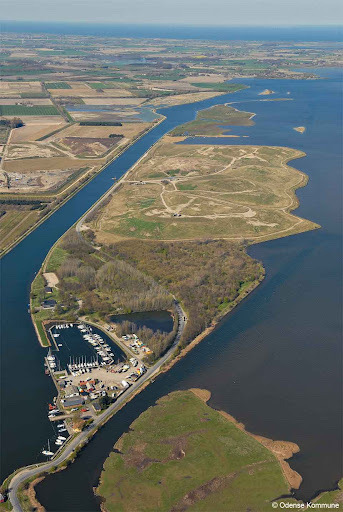
It is an artificially constructed island that was turned into a dump which made it grow bigger and bigger as more trash was piled on top.
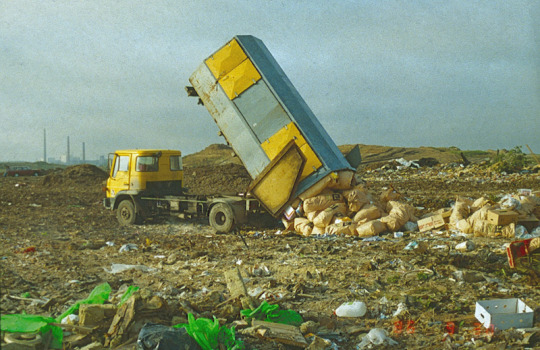
Eventually the dump was closed down by covering it in a thick layer of dirt which is why the island is full of hills and bumps. A web of paths were created and the landscape was dotted with playgrounds and picnic tables and today it’s an incredibly popular place for the locals to relax.
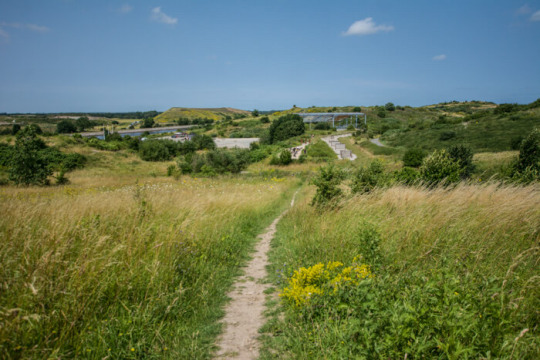
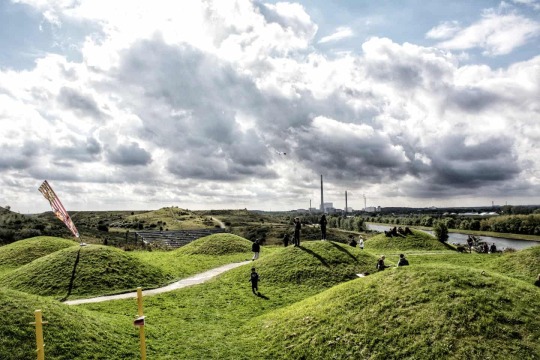
Unfortunately most photos online show the island in its early sorta barren state because today it has become a haven for all sorts of plant and animal life skittering around in the dense bushes. It’s a wonderful place to go birdwatching, fishing or pick berries.
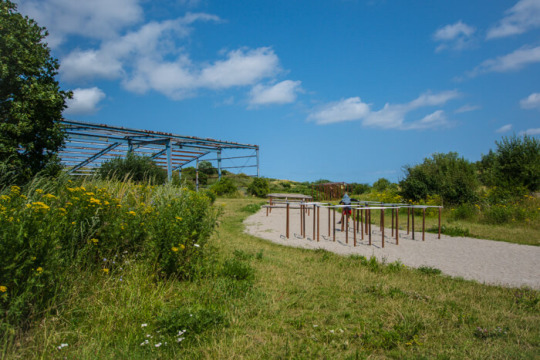
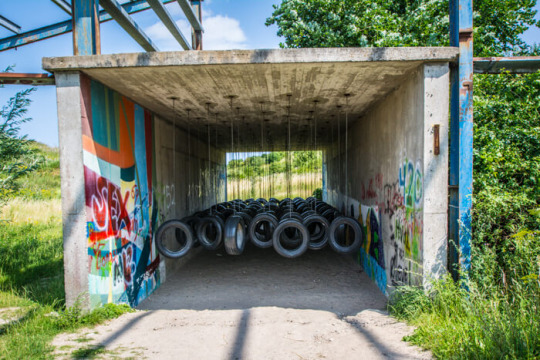
But the trash is still down there creating methane gas. What did the city do about that? Harvest it for energy of course! So when you walk around the island you’ll see pipes and what appears to be manholes that are part of this sophisticated system.
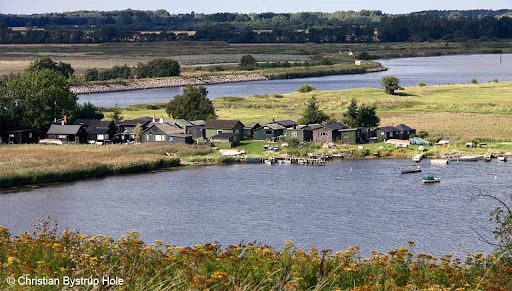
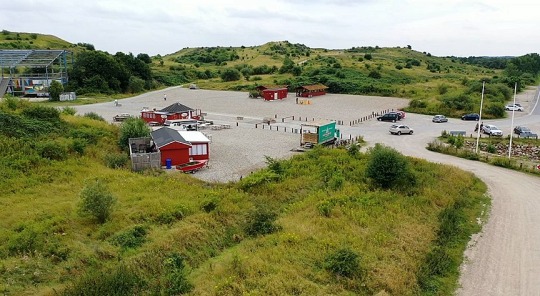
You can look at it in two ways. To me it’s a wonderful solution to turn this former dump into a beautiful green area for wildlife and people to use while also using it for energy, but the idea that something fire related could happen and blow the entire thing up and unearth the dirt of the past is pretty tempting.
5K notes
·
View notes
Text

i saw grian and skizz’s bdubs-gnome-thing and IMMEDIATELY started crying actual tears of laughter, these little Creatures are so important to me
#my art#my posts#guess the build#grian#skizzleman#ethoslab#bdoubleo100#the build got revealed and i immediately started blindly pawing around for my tablet through tears#look at them. little guys#skittering about with nary a care in the world#they’re perfect
5K notes
·
View notes